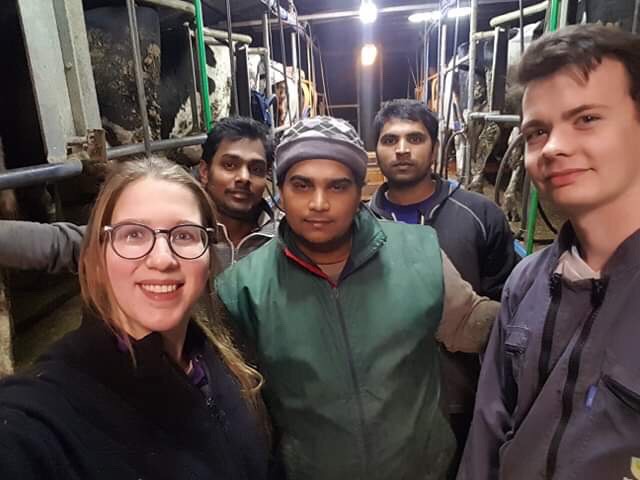Erasmus+ at the heart of the Bergerie
The Erasmus+ agency has organized a European meeting with 12 invited countries at the Bergerie nationale de Rambouillet on the theme of « Agroecology, technical and educational approach », in mid-April 2023.
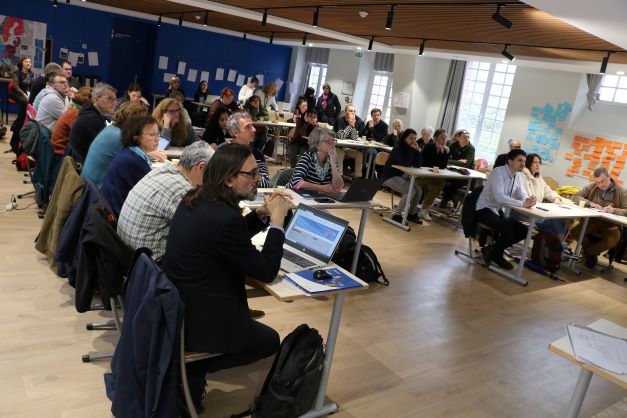 The 35 participants present from April 12 to 14, 2023, from Belgium, Germany, Luxembourg, Denmark, Finland, Latvia, Turkey, Poland, Sweden, Spain, Estonia and France, took an active part in the activities proposed around agroecological issues to build their future projects with one or more of the European partners present.
The 35 participants present from April 12 to 14, 2023, from Belgium, Germany, Luxembourg, Denmark, Finland, Latvia, Turkey, Poland, Sweden, Spain, Estonia and France, took an active part in the activities proposed around agroecological issues to build their future projects with one or more of the European partners present.
A unifying theme
The aim of this thematic seminar was to promote agroecology as a way of designing sustainable production systems, and to encourage participants from all over Europe to share their different experiences and best practices. Agroecology is part of the fight against climate change and support for ecological transition, which is one of the main priorities of the Erasmus+ 2021-2027 program. This priority is itself the declination of the Green Deal for Europe [Green-Deal], a European strategy supported by the European Commission.
The meeting focused on a number of themes and priorities, through the discovery of agro- ecology experiences: different European projects, different teaching methods. One of the principles of these exchanges is to draw inspiration from and share with other Europeans: different perceptions, current situations and experiences. The aim is also to explore ways of implementing agroecology in Erasmus+ projects. Last but not least, the three-day seminar is an opportunity to take the time to meet potential and future partners: to set up Erasmus+ projects, and to create links and new networks.
2 days of reflection
As soon as they arrived, the participants from all over Europe got to know each other and discovered the Bergerie nationale site during a horse-drawn carriage ride. 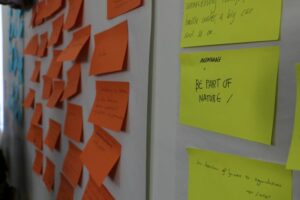 Participants then shared their views on agro-ecology, sustainability and how these concepts should be taught. Some
Participants then shared their views on agro-ecology, sustainability and how these concepts should be taught. Some 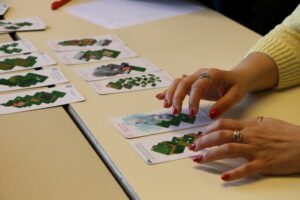 presented their experiences of agro-ecology projects in a poster session. The others were able to find out about these experiences and this gave rise to exchanges of practice. The representatives of each partner institution enthusiastically took part in each workshop, which offered a range of activities: the fundamentals of agro-ecology, the « AgroChallenges » serious game for agricultural education and the « Agro-ecology » kit EducLocalFOOD. The programme for the meeting included a tour of the agro-ecology principles followed at the Bergerie nationale farm. Speeches by researchers, experts in agro-ecology and in educational issues, enabled these two aspects to be explored in greater depth.
presented their experiences of agro-ecology projects in a poster session. The others were able to find out about these experiences and this gave rise to exchanges of practice. The representatives of each partner institution enthusiastically took part in each workshop, which offered a range of activities: the fundamentals of agro-ecology, the « AgroChallenges » serious game for agricultural education and the « Agro-ecology » kit EducLocalFOOD. The programme for the meeting included a tour of the agro-ecology principles followed at the Bergerie nationale farm. Speeches by researchers, experts in agro-ecology and in educational issues, enabled these two aspects to be explored in greater depth.
At the end of the meeting, participants were reminded of the opportunities for Erasmus + projects, and they were able to network with each other and start thinking about ideas for projects in Belgium, Denmark, Estonia and elsewhere. Some got in touch to develop student mobility for periods of study or work experience between the agricultural education institutions in Yvetot (Normandy) and Norwegian and Belgian structures; others wanted to get involved in partnership projects that would lead to the production of resources between Danish and Belgian universities. Estonia wants to work on teaching in the field of landscaping and beekeeping, while others have seized the opportunity, just before leaving, to reflect on a rapprochement on ancestral practices such as transhumance (institution of Sartene – Corsica/Turkey university). Despite mixed weather conditions, the meeting took place in an environment that was highly conducive to exchanges, which should encourage the development of new Erasmus + projects.
 It has to be said that the offbeat and sympathetic approach of the professional cartoonist and the quality meals, prepared with respect for ‘AB’ products and/or from local produce, by the Bergerie’s catering service, also contributed to the success of the meeting. The participants left delighted with their experience in Rambouillet and highly motivated to set up European projects. Agroecology taught at La Bergerie – Since 1994, La Bergerie, a zootechnical teaching centre, has been a pioneer in raising awareness of the concept of sustainable development and offers a wide range of training courses, particularly in agroecology. Agroecology is an environmentally-friendly form of agriculture that seeks to improve biomass renewal, ensure favourable soil conditions for plant growth and make the most of biological interactions by using ecological processes. It favours farming that is profitable, more self-sufficient and more local. The Bergerie Nationale aims to develop a coherent production system for its farm.
It has to be said that the offbeat and sympathetic approach of the professional cartoonist and the quality meals, prepared with respect for ‘AB’ products and/or from local produce, by the Bergerie’s catering service, also contributed to the success of the meeting. The participants left delighted with their experience in Rambouillet and highly motivated to set up European projects. Agroecology taught at La Bergerie – Since 1994, La Bergerie, a zootechnical teaching centre, has been a pioneer in raising awareness of the concept of sustainable development and offers a wide range of training courses, particularly in agroecology. Agroecology is an environmentally-friendly form of agriculture that seeks to improve biomass renewal, ensure favourable soil conditions for plant growth and make the most of biological interactions by using ecological processes. It favours farming that is profitable, more self-sufficient and more local. The Bergerie Nationale aims to develop a coherent production system for its farm.
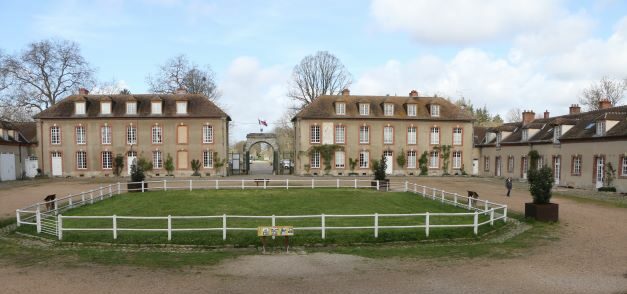
Contacts: Marie-Laure WEBER, International Cooperation Officer – National Training Programme Coordinator, CEZ – Bergerie nationale, marie-laure.weber@bergerie-nationale.fr
Photo credits: Humorous illustrations by Eric Tartrais, photographs by Isabelle Hervé – MASA
